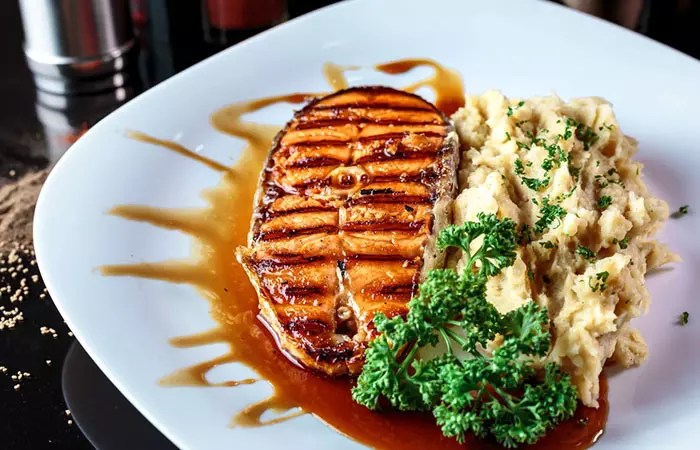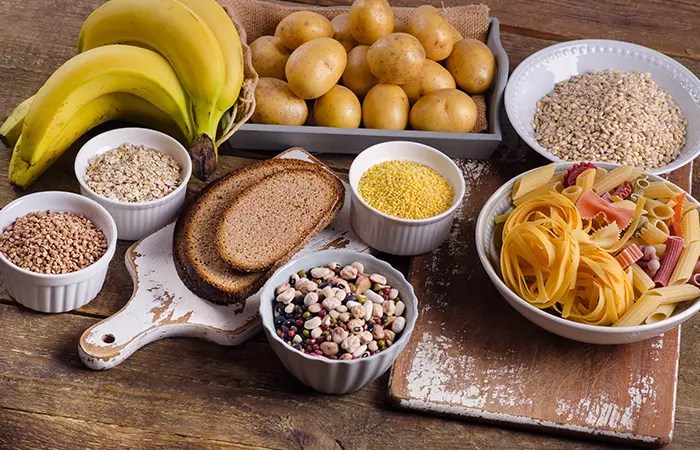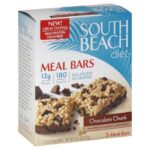South Beach Phase 2 Food List: Unlocking the secrets to successful weight loss with this comprehensive guide to the foods you can (and can’t) enjoy during this crucial phase of the South Beach Diet. We’ll break down the permitted and prohibited foods, offer delicious recipe ideas, and provide practical tips to navigate any challenges you might encounter. Get ready to transform your eating habits and achieve your health goals.
This isn’t just another diet list; it’s your roadmap to understanding the nutritional science behind the South Beach Diet’s Phase 2. We’ll delve into the rationale behind the food restrictions, explaining how they impact blood sugar and insulin levels for optimal weight management and overall well-being. Prepare for a journey of delicious, healthy eating that will leave you feeling energized and satisfied.
South Beach Phase 2 Dietary Restrictions
South Beach Diet Phase 2 builds upon the initial phase by gradually reintroducing certain foods while maintaining a focus on minimizing blood sugar spikes and promoting healthy insulin response. This phase is crucial for establishing sustainable dietary habits and achieving long-term weight management goals. Understanding the specific restrictions and their rationale is key to successful implementation.The restrictions in South Beach Phase 2 primarily target foods that are rapidly digested and cause significant elevations in blood glucose and insulin levels.
These rapid fluctuations can lead to increased hunger, cravings, and ultimately, weight gain. By limiting these foods, the diet aims to stabilize blood sugar, reduce insulin resistance, and promote a feeling of satiety.
Foods Restricted in South Beach Phase 2
This phase continues to restrict many processed foods, high-glycemic index carbohydrates, and unhealthy fats. The rationale behind these restrictions centers on their impact on metabolic processes and overall health.
| Food Category | Permitted Foods | Prohibited Foods | Rationale |
|---|---|---|---|
| Grains | Whole-grain breads (in moderation), small portions of brown rice, quinoa | White bread, white rice, pastries, most cereals | High-glycemic index carbohydrates cause rapid blood sugar spikes and insulin release, leading to increased hunger and fat storage. Whole grains are preferred due to their higher fiber content, which slows digestion. |
| Fruits | Berries (in moderation), small portions of other low-glycemic fruits | High-glycemic fruits like bananas, mangoes, grapes (in large quantities) | Fruits contain natural sugars, and high-glycemic fruits can contribute to blood sugar fluctuations. Moderation and choosing lower-glycemic options is key. |
| Sugars and Sweets | None | Sugary drinks, candy, desserts, honey, maple syrup | Added sugars provide empty calories and contribute significantly to weight gain and metabolic dysfunction. |
| Dairy | Skim or low-fat milk, plain yogurt (unsweetened) | Full-fat dairy products, high-sugar yogurts | Full-fat dairy can be high in saturated fat. High-sugar yogurts negate the benefits of the diet. |
| Fats | Monounsaturated and polyunsaturated fats (olive oil, avocados, nuts, seeds) | Trans fats, saturated fats (excess red meat, processed meats) | Unsaturated fats support heart health and provide satiety. Trans and saturated fats contribute to heart disease and weight gain. |
| Starchy Vegetables | Corn (in moderation), peas (in moderation) | Potatoes (white and sweet), parsnips | Starchy vegetables are higher in carbohydrates than non-starchy vegetables and can contribute to blood sugar fluctuations. |
Recipe Ideas for South Beach Phase 2: South Beach Phase 2 Food List
South Beach Diet Phase 2 allows for a wider variety of foods compared to Phase 1, incorporating healthy fats and a greater selection of vegetables. This increased flexibility opens up a world of delicious and satisfying recipe possibilities. The key is to focus on lean proteins, plenty of non-starchy vegetables, and healthy fats, while still limiting refined carbohydrates and sugary foods.
The following recipes offer a taste of what’s possible.
South Beach Phase 2 Recipe Examples
The following recipes are designed to be both delicious and compliant with the South Beach Diet Phase 2 guidelines. They are simple to prepare and offer a good balance of nutrients.
| Recipe Name | Ingredients | Instructions | Serving Size |
|---|---|---|---|
| Grilled Salmon with Asparagus and Lemon |
|
|
1 |
| Chicken and Vegetable Stir-Fry |
|
|
2-3 |
| Zucchini Noodles with Shrimp and Pesto |
|
|
1 |
Snacking Options for South Beach Phase 2

Maintaining healthy blood sugar levels and staying satisfied between meals is crucial for successful weight management on the South Beach Diet. Phase 2, while allowing a wider variety of foods, still necessitates mindful snacking to avoid derailing progress. The key is choosing snacks that are low in refined carbohydrates and high in protein and healthy fats to keep you feeling full and energized.Smart snacking during South Beach Phase 2 helps prevent overeating at larger meals and keeps energy levels stable, preventing those mid-afternoon slumps that often lead to unhealthy choices.
The following options provide both nutritional benefits and convenience, fitting seamlessly into a busy lifestyle.
Five Healthy and Convenient South Beach Phase 2 Snacks
The following list Artikels five snack options, along with portion sizes, that are perfectly aligned with the principles of the South Beach Diet Phase 2. These snacks are designed to be both satisfying and supportive of your weight loss goals.
- Hard-boiled eggs (2): Approximately 150 calories. Hard-boiled eggs are a powerhouse of protein, crucial for satiety and muscle maintenance. They are also rich in choline, essential for brain health. The protein content helps regulate blood sugar levels, preventing energy crashes common with other snacks.
- A handful of almonds (1/4 cup): Approximately 200 calories. Almonds are a great source of healthy monounsaturated fats, fiber, and vitamin E. The healthy fats contribute to satiety, keeping hunger at bay for longer periods. Fiber aids digestion and helps regulate blood sugar.
- Greek yogurt (1 cup, plain, nonfat): Approximately 150 calories. Greek yogurt is packed with protein, contributing to feelings of fullness and supporting muscle growth. Choose plain, nonfat varieties to minimize added sugars and keep it aligned with the South Beach Diet’s principles. You can add a sprinkle of cinnamon for extra flavor.
- Celery sticks with 2 tablespoons of almond butter: Approximately 200 calories. This snack combines the fiber-rich celery with the healthy fats and protein of almond butter. The combination provides sustained energy and prevents blood sugar spikes.
- Small avocado (1/2): Approximately 160 calories. Avocados are rich in healthy monounsaturated fats, fiber, and potassium. These fats contribute to satiety, helping to control appetite and prevent overeating. The fiber aids digestion and promotes healthy gut function.
Grocery Shopping List for South Beach Phase 2

Successfully navigating the South Beach Diet Phase 2 requires careful meal planning and a well-stocked pantry. This grocery list provides a comprehensive guide to the essential ingredients you’ll need to create delicious and healthy meals that align perfectly with the dietary restrictions of this phase. Remember to adjust quantities based on your individual needs and preferences.
This list is categorized by food group for easy shopping and organization. Prioritizing whole, unprocessed foods is key to maximizing the benefits of the South Beach Diet. Remember to check labels carefully to ensure products meet the phase 2 guidelines regarding sugar and carbohydrate content.
South Beach Phase 2 Grocery List
| Food Group | Item | Quantity | Notes |
|---|---|---|---|
| Fruits | Berries (strawberries, blueberries, raspberries) | 1 pint | Low-glycemic index fruits are preferred. |
| Fruits | Avocado | 2 | Healthy fats and fiber. |
| Fruits | Lemon | 1 | For flavoring and dressings. |
| Vegetables | Leafy Greens (spinach, kale, lettuce) | 1 large container | Base for salads and side dishes. |
| Vegetables | Broccoli | 1 head | Versatile and nutrient-rich. |
| Vegetables | Asparagus | 1 bunch | Excellent source of fiber. |
| Vegetables | Bell Peppers (various colors) | 2 | Add color and flavor to meals. |
| Vegetables | Onions | 2 | Essential for many recipes. |
| Vegetables | Garlic | 1 bulb | Adds flavor and health benefits. |
| Proteins | Salmon | 1 lb | Excellent source of omega-3 fatty acids. |
| Proteins | Chicken Breast | 1.5 lb | Lean protein source. |
| Proteins | Eggs | 1 dozen | Versatile and high in protein. |
| Proteins | Tuna (canned in water) | 2 cans | Quick and convenient protein option. |
| Healthy Fats | Olive Oil | 1 bottle | Use for cooking and dressings. |
| Healthy Fats | Avocado Oil | 1 bottle | High smoke point, ideal for cooking. |
| Healthy Fats | Nuts (almonds, walnuts) | 1 cup | Healthy fats and protein. Portion control is important. |
| Dairy/Alternatives | Unsweetened Almond Milk | 1 carton | Dairy-free option. Check for added sugars. |
| Grains (limited) | Whole Wheat Bread (small loaf) | 1 | Choose low-carb options and consume in moderation. |
| Seasonings & Other | Herbs and Spices (basil, oregano, cumin, etc.) | Variety | Enhance flavor without adding calories. |
| Seasonings & Other | Salt and Pepper | To taste | Basic seasonings. |
Potential Challenges and Solutions during South Beach Phase 2
South Beach Diet Phase 2, while offering a flexible approach to weight loss compared to Phase 1, still presents unique challenges. Successfully navigating this phase requires understanding common hurdles and implementing proactive strategies to overcome them. This section details typical difficulties and provides practical solutions to ensure continued progress and adherence to the diet.
Common Challenges Faced During South Beach Phase 2
The transition to Phase 2, with its wider range of permitted foods, can introduce new obstacles. Many individuals find themselves grappling with specific issues that impact their ability to maintain consistent adherence to the dietary guidelines. These challenges, if not properly addressed, can lead to setbacks and derail the overall weight loss journey.
Strategies for Overcoming South Beach Phase 2 Challenges, South Beach Phase 2 Food List
Addressing the challenges of Phase 2 requires a multi-pronged approach, combining mindful eating habits with practical strategies for navigating social situations and managing cravings. By proactively implementing these solutions, individuals can significantly improve their chances of success and achieve their weight loss goals.
Challenge and Solution Matrix for South Beach Phase 2
The following table summarizes common challenges and their corresponding solutions:
| Challenge | Solution |
|---|---|
| Increased cravings for sweets and processed foods. | Focus on increasing consumption of healthy fats and protein to promote satiety. Incorporate naturally sweet foods like berries and a small amount of dark chocolate (70% cacao or higher) to satisfy cravings in a healthy way. Gradually reduce reliance on artificial sweeteners. |
| Difficulty navigating social situations involving unhealthy food. | Plan ahead. If attending a party or social event, eat a healthy meal beforehand to minimize hunger and temptation. Choose wisely from the available options, focusing on lean proteins, vegetables, and healthy fats. Don’t be afraid to politely decline unhealthy choices. |
| Feeling overwhelmed by the range of permitted foods. | Start with a simple meal plan focusing on a few key ingredients and recipes. Gradually expand your repertoire as you become more comfortable. Utilize online resources and cookbooks specifically designed for the South Beach Diet to find inspiration and new recipes. |
| Plateauing in weight loss. | Review your calorie intake and ensure you’re maintaining a slight caloric deficit. Increase physical activity levels. Consider incorporating strength training to build muscle mass, which boosts metabolism. Consult a healthcare professional or registered dietitian to rule out any underlying medical issues. |
| Lack of variety in meals, leading to boredom and reduced adherence. | Explore a wide range of healthy recipes and cooking techniques. Experiment with different spices and herbs to add flavor to your meals. Incorporate a variety of fruits, vegetables, and lean proteins to prevent dietary monotony. |
Mastering the South Beach Phase 2 Food List is key to unlocking the diet’s full potential. By understanding the permitted and prohibited foods, and incorporating the strategies and recipes provided, you’ll be well-equipped to navigate this phase successfully. Remember, consistency and mindful eating are crucial. This isn’t just about weight loss; it’s about cultivating a healthier relationship with food and achieving lasting results.
So, dive in, experiment with the recipes, and enjoy the delicious journey towards a healthier you.

